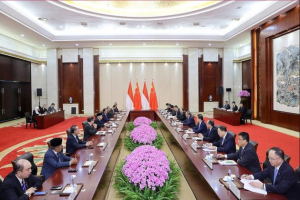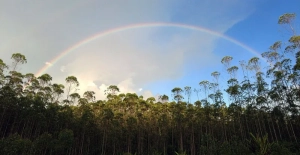Indonesia, WRI join forces to achieve FOLU Net Sink 2030 targets
Indonesia's Ministry of Environment and Forestry and the World Resources Institute (WRI), a global research non-profit organization, have teamed up on February 17, 2023, to achieve the objectives of the FOLU (Forestry and Other Land Uses) Net Sink 2030. These objectives include decreasing emissions from the forestry and other land use industry and increasing carbon absorption, Antara news agency reported.
“Indonesia's FOLU Net Sink 2030 is an important part of the country's efforts to achieve its climate goals under the Paris Agreement. With nearly 60% contribution to reducing the greenhouse gas (GHG) emissions, it plays a significant role in fulfilling Indonesia's obligations toward its Nationally Determined Contribution (NDC),” Environment and Forestry Minister Siti Nurbaya Bakar explained in Jakarta.
She mentioned that the partnership had a goal of exploring extensive strategies, approaches and procedures in using satellite imaging to map out lands.
Impressive steps
Indonesia and the WRI's target under the FOLU Net Sink plan is to decrease carbon dioxide equivalent (CO2e) emissions by up to 140 million tons by 2030.
Another goal is to develop procedures and approaches for conducting land inventories by interpreting satellite images and conducting fieldwork.
The collaboration will entail technical discussions regarding the monitoring systems for FOLU, sharing of expertise to enhance the technical alignment of these monitoring systems, and cooperation in global forums on topics of shared concern, Forest Insights reported.
According to the WRI President Ani Dasgupta, Indonesia's 2030 FOLU Net Sink is an impressive and innovative initiative by the government. He believes that it highlights the level of Indonesia's dedication to combat the rapid deforestation that has been occurring in recent years.
Dasgupta also conveyed his excitement regarding the recently established technical partnership.
“I am excited about our technical collaboration that begins today under the leadership of Minister Nurbaya. We hope to synergize our joint technical efforts to show how Indonesia is progressing toward its globally important climate targets,” he stated.
Carbon emission reduction target
The government has raised its goal for reducing greenhouse gas emissions. According to the latest Enhanced Nationally Determined Contribution (ENDC) document, Indonesia has increased its target for emission reduction from 29% to 31.89% by 2030 through its own capabilities.
Meanwhile, the target for reducing greenhouse gas emissions through international cooperation has also been increased from 41% to 43.2%.
In 2019, Indonesia successfully reduced 54.8 million tons of CO2e. This exceeded the set target of 51 million tons of CO2e. A year later, the country successfully reduced 64.4 million tons of CO2e. This exceeded the set target of 58 million tons of CO2e.
In 2021, Indonesia managed to reduce 69.5 million tons of CO2e. This exceeded the set target of 67 million tons of CO2e.
Lastly in 2022, Indonesia successfully reduced 91.5 million tons of CO2e. This exceeded the set target of 91 million tons of CO2e.
Vice President Ma’ruf Amin emphasized that Indonesia has been taking concrete steps to address the climate crisis through various strategic efforts, which include significantly reducing greenhouse gas emissions.
The government has put in place various policies to address the climate crisis, including expanding nature conservation and restoration, introducing carbon taxes, promoting the development of electric vehicles and launching the B40 biodiesel program.
Already have an account? Sign In
-
Start reading
Freemium
-
Monthly Subscription
30% OFF$26.03
$37.19/MonthCancel anytime
This offer is open to all new subscribers!
Subscribe now -
Yearly Subscription
33% OFF$228.13
$340.5/YearCancel anytime
This offer is open to all new subscribers!
Subscribe now






